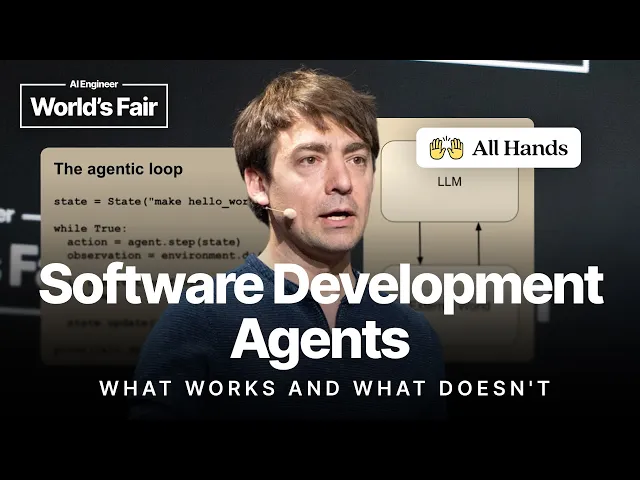Software Development Agents: What Works and What Doesn’t

AI coding agents show promise but have limits
The landscape of software development is rapidly evolving with the emergence of autonomous coding agents. Having watched Robert Brennan's insightful presentation on software development agents, I'm struck by both the significant potential and current limitations of these AI systems. We're witnessing the early stages of a transformation that could fundamentally alter how software gets built, even as the technology still struggles with complex engineering tasks.
Key insights from the presentation
-
Autonomous agents excel at specific tasks but struggle with complex, multi-stage engineering problems that require deep contextual understanding.
-
The most effective workflow combines AI capabilities with human oversight – having developers review, approve, and guide the AI's suggestions rather than letting agents run completely unsupervised.
-
Current limitations center around context management – agents struggle to maintain coherent understanding across large codebases and complex requirements, often leading to hallucinated or incomplete solutions.
-
The technology shows the most promise in specific domains like data pipeline creation, web development, and dashboard building, where patterns are well-established and goals are clearly definable.
The power of human-AI collaboration
The most compelling insight from Brennan's talk is the recognition that the most effective implementation isn't about replacing developers but augmenting them. Rather than pursuing fully autonomous systems that attempt to replace human engineers (which invariably fall short), the current sweet spot involves systems that can handle routine coding tasks while allowing developers to focus on architecture, design decisions, and quality control.
This matters tremendously in the context of today's software industry. With persistent developer shortages and increasing demand for digital solutions, tools that can effectively multiply developer productivity represent a strategic advantage. However, the key is finding the right division of labor – where AI handles the predictable, pattern-based work while humans contribute creativity, judgment, and contextual understanding.
Beyond the presentation: The bigger picture
What Brennan didn't fully explore is how these technologies might reshape software engineering careers. While many discussions focus on the potential for AI to replace developers, the more likely outcome is a shift in skills emphasis. Junior developers may need to develop stronger architectural thinking earlier, as code generation becomes increasingly automated. Meanwhile, senior engineers might spend less time writing code and more time defining systems, reviewing AI outputs, and handling the complex integration challenges that AI still struggles with.
We
Recent Videos
How To Earn MONEY With Images (No Bullsh*t)
Smart earnings from your image collection In today's digital economy, passive income streams have become increasingly accessible to creators with various skill sets. A recent YouTube video cuts through the hype to explore legitimate ways photographers, designers, and even casual smartphone users can monetize their image collections. The strategies outlined don't rely on unrealistic promises or complicated schemes—instead, they focus on established marketplaces with proven revenue potential for image creators. Key Points Stock photography platforms like Shutterstock, Adobe Stock, and Getty Images remain viable income sources when you understand their specific requirements and optimize your submissions accordingly. Specialized marketplaces focusing...
Oct 3, 2025New SHAPE SHIFTING AI Robot Is Freaking People Out
Liquid robots will change everything In the quiet labs of Carnegie Mellon University, scientists have created something that feels plucked from science fiction—a magnetic slime robot that can transform between liquid and solid states, slipping through tight spaces before reassembling on the other side. This technology, showcased in a recent YouTube video, represents a significant leap beyond traditional robotics into a realm where machines mimic not just animal movements, but their fundamental physical properties. While the internet might be buzzing with dystopian concerns about "shape-shifting terminators," the reality offers far more promising applications that could revolutionize medicine, rescue operations, and...
Oct 3, 2025How To Do Homeless AI Tiktok Trend (Tiktok Homeless AI Tutorial)
AI homeless trend raises ethical concerns In an era where social media trends evolve faster than we can comprehend them, TikTok's "homeless AI" trend has sparked both creative engagement and serious ethical questions. The trend, which involves using AI to transform ordinary photos into images depicting homelessness, has rapidly gained traction across the platform, with creators eagerly jumping on board to showcase their digital transformations. While the technical process is relatively straightforward, the implications of digitally "becoming homeless" for entertainment deserve careful consideration. The video tutorial provides a step-by-step guide on creating these AI-generated images, explaining how users can transform...
